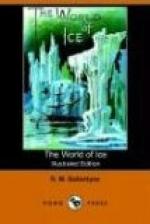In thus minutely recounting the various expedients which these banished men fell upon to pass the long dark hours of an Arctic winter, we may, perhaps, give the reader the impression that a great deal of thought and time were bestowed upon amusement, as if that were the chief end and object of their life in those regions. But we must remind him that though many more pages might be filled in recounting all the particulars, but a small portion of their time was, after all, taken up in this way; and it would have been well for them had they been able to find more to amuse them than they did, for the depressing influence of the long-continued darkness, and the want of a sufficiency of regular employment for so many months added to the rigorous nature of the climate in which they dwelt, well-nigh broke their spirits at last.
In order to secure warmth during winter, the deck of the ship was padded with moss about a foot deep, and down below the walls were lined with the same material. The floors were carefully plastered with common paste and covered with oakum a couple of inches deep, over which a carpet of canvas was spread. Every opening in the deck was fastened down and covered deeply over with moss, with the exception of one hatch, which was their only entrance, and this was kept constantly closed except when it was desirable to ventilate. Curtains were hung up in front of it to prevent draughts. A canvas awning was also spread over the deck from stem to stern, so that it was confidently hoped the Dolphin would prove a snug tenement even in the severest cold.
As has been said before, the snow-drift almost buried the hull of the ship, and as snow is a good non-conductor of heat, this further helped to keep up the temperature within. A staircase of snow was built up to the bulwarks on the larboard quarter, and on the starboard side an inclined plane of snow was sloped down to the ice to facilitate the launching of the sledges when they had to be pulled on deck.
Such were the chief arrangements and preparations that were made by our adventurers for spending the winter; but although we have described them at this point in our story, many of them were not completed until a much later period.
CHAPTER XI.
A hunting-expedition, in the course of which the hunters meet with many interesting, dangerous, peculiar, and remarkable experiences, and make acquaintance with seals, walruses, deer, and rabbits.
We must now return to Fred Ellice and his companions, Meetuck the Esquimau, O’Riley, and Joseph West, whom we left while they were on the point of starting on a hunting-expedition.
They took the direction of the ice-hummocks out to sea, and, seated comfortably on a large sledge, were dragged by the team of dogs over the ice at the rate of ten miles an hour.
“Well! did I iver expect to ride a carriage and six?” exclaimed O’Riley in a state of great glee as the dogs dashed forward at full speed, while Meetuck nourished his awful whip, making it crack like a pistol-shot ever and anon.




